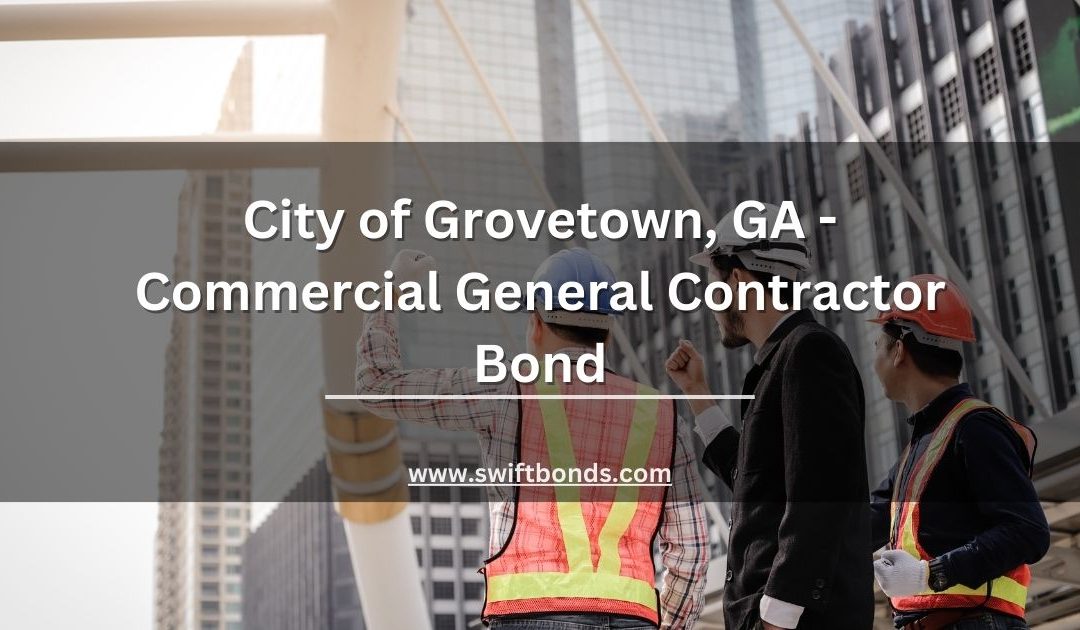Introduction
From our perspective, commercial general contractors in Grovetown, GA have an important responsibility to uphold safety and regulatory standards in their projects. Before they can legally operate, they must obtain a Commercial General Contractor ($20,000) Bond as part of the licensing process.
This bond acts as a financial guarantee, ensuring that contractors follow local codes, complete projects according to their agreements, and address any financial obligations tied to their work. This requirement is similar to the City of Douglasville, GA – Residential Code Compliance ($10,000) Bond, which applies to residential builders, and the City of Grovetown, GA – Contractor License ($5,000) Bond, which covers general licensing needs for smaller-scale contractors.
For contractors unfamiliar with the bonding process, the details of this requirement can sometimes seem overwhelming. Understanding what this bond covers, how it benefits contractors, and how to obtain one is key to a smooth licensing process and long-term business success.

We’ve Noticed That Some Contractors Are Confused About This Requirement
We’ve noticed that many contractors struggle to understand why this bond is necessary. Some assume it functions like insurance, covering their business in case of disputes. Others believe it’s just another licensing fee without added value.
Unlike insurance, which protects the contractor, this bond is designed to protect clients, suppliers, and the public. If a contractor fails to meet contractual obligations, violates regulations, or leaves a project incomplete, the bond provides a financial safety net for those affected.
The requirement exists because construction projects involve significant financial and safety risks. Without a bonding system in place, clients and the city would have little recourse if a contractor abandoned a job or failed to meet quality standards. The bond acts as a layer of accountability, ensuring contractors operate with integrity.
Based on Our Experience, This Bond Benefits Both Contractors and Clients
Based on our experience, securing this bond provides key advantages beyond just meeting a legal requirement. Contractors with a Commercial General Contractor ($20,000) Bond can:
- Legally operate in Grovetown, GA – This bond is mandatory for obtaining a commercial contractor’s license. Without it, contractors may face delays or be unable to take on projects.
- Build credibility with clients – Being bonded signals to clients that a contractor is financially responsible and committed to quality work. Many clients specifically look for bonded contractors when choosing who to hire.
- Avoid costly penalties – Failing to secure this bond can lead to fines, rejected permits, and even legal action, which could slow down business operations.
- Gain access to larger projects – Many commercial contracts require proof of bonding before awarding jobs. Holding the right bond allows contractors to bid on more significant projects.
For clients, knowing a contractor is bonded provides peace of mind. If something goes wrong, they have financial protection and a means to seek compensation.

What We’ve Discovered Is That Obtaining This Bond Is a Simple Process
What we’ve discovered is that obtaining a Commercial General Contractor ($20,000) Bond is straightforward when contractors follow the right steps. The process typically includes:
- Gathering the required business information – Contractors need to provide details about their company, including legal structure, ownership, and licensing information.
- Applying through a surety bond provider – A surety company evaluates the contractor’s financial stability and experience before issuing the bond.
- Receiving a quote – Bond costs vary based on the contractor’s credit history and financial standing. Those with strong credit typically pay a lower percentage of the bond amount.
- Purchasing the bond – Once approved, the contractor pays the premium and receives the bond, which must be submitted to the appropriate licensing authority.
Many contractors assume this process is time-consuming, but working with the right surety provider speeds things up significantly.
We’ve Found That Acting Early Prevents Delays
We’ve found that contractors who secure their bond early in the licensing process avoid unnecessary delays. Since this bond is a required step, waiting too long to obtain it can push back project timelines and cause frustration.
By being proactive, contractors can focus on growing their business instead of dealing with licensing hurdles. Additionally, having an active bond in place allows contractors to bid on jobs confidently, knowing they meet all regulatory requirements.

In Our Observation, Not Having This Bond Can Lead to Setbacks
In our observation, failing to obtain a Commercial General Contractor ($20,000) Bond can create challenges that are difficult to recover from. Without this bond:
- Contractors may be denied a license – Operating without the required bond means not having the proper credentials to take on projects.
- Permits may be delayed – Without proof of bonding, contractors may struggle to secure the necessary permits to begin work.
- Clients may choose another contractor – Many clients prefer to work with bonded contractors since it provides them with financial protection.
- Legal issues can arise – Working without a required bond can lead to penalties, legal action, and increased regulatory scrutiny.
Understanding these risks highlights why meeting bonding requirements should be a top priority for commercial contractors.
We’ve Learned That Having the Right Bond Leads to Long-Term Success
We’ve learned that contractors who prioritize compliance with bonding requirements set themselves up for long-term success. By securing the right bond, contractors in Grovetown can:
- Expand their business opportunities – Many large projects require proof of bonding, allowing contractors to take on higher-value jobs.
- Establish trust with clients and regulatory agencies – Holding an active bond demonstrates financial responsibility and professionalism.
- Operate smoothly without disruptions – Avoiding fines, licensing delays, and legal complications helps businesses stay focused on growth.
Whether it’s securing a Commercial General Contractor ($20,000) Bond, a City of Douglasville, GA – Residential Code Compliance ($10,000) Bond, or a City of Grovetown, GA – Contractor License ($5,000) Bond, contractors who stay ahead of bonding requirements gain a competitive edge in the construction industry.

Conclusion
We’ve come to appreciate how important it is for commercial contractors in Grovetown, GA, to have the right bonding strategy. The Commercial General Contractor ($20,000) Bond is more than just a legal requirement—it is a tool that helps contractors build trust, expand their opportunities, and operate without unnecessary risks.
By securing this bond early, contractors can focus on what they do best—delivering quality construction projects—while demonstrating their commitment to professionalism and compliance. For those looking to get started, partnering with a reliable surety provider like Swiftbonds makes the process seamless and stress-free.
Frequently Asked Questions
We’ve Often Noticed That Contractors Ask: How Much Does This Bond Cost?
The cost of a Commercial General Contractor ($20,000) Bond varies based on the contractor’s credit score and financial history. Most contractors pay a small percentage of the bond amount, typically between 1% and 5% of the total.
We’ve Often Noticed That Some Contractors Are Unsure If They Need This Bond
If a contractor plans to work on commercial projects in Grovetown, GA, this bond is required. It is a mandatory step in obtaining a commercial general contractor’s license.
We’ve Often Noticed That Contractors Want to Know How Long the Bond Lasts
This bond typically remains active for one year and must be renewed annually to maintain compliance with licensing requirements.
We’ve Often Noticed That Contractors Ask If They Can Get a Bond With Bad Credit
Yes, contractors with lower credit scores can still obtain this bond, though they may pay a higher premium. Some surety providers offer flexible financing options to help contractors meet this requirement.


